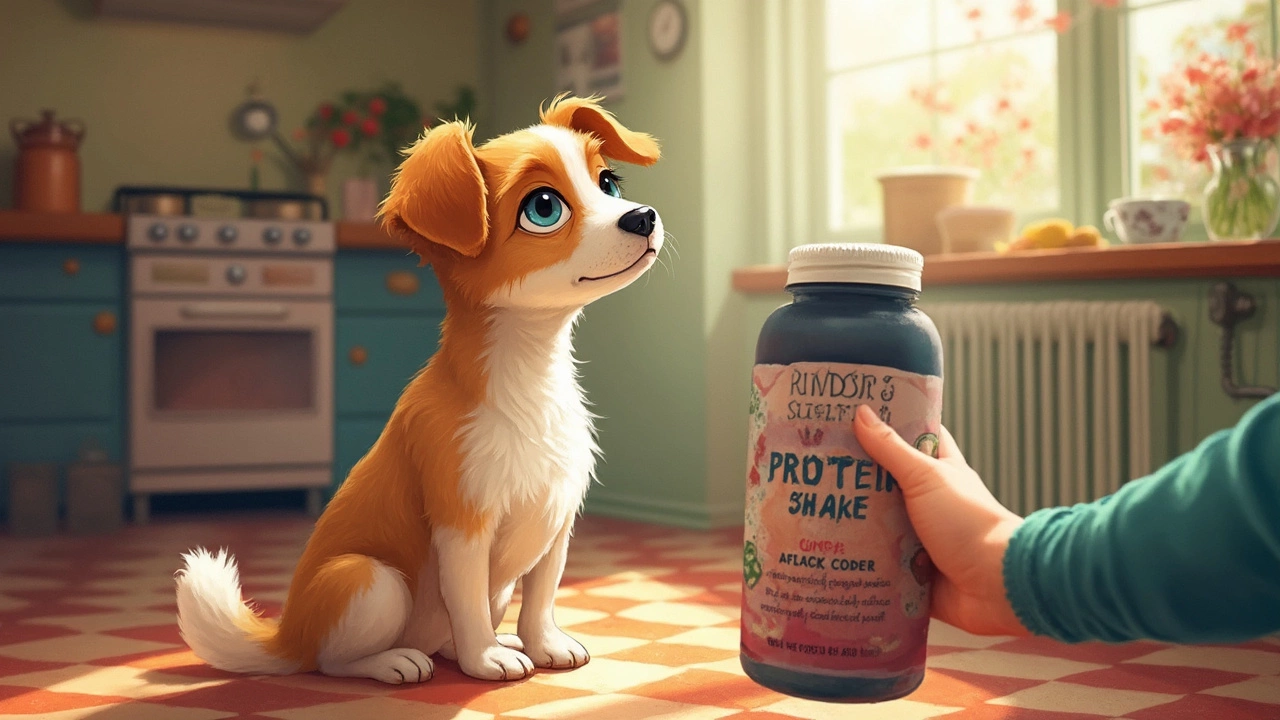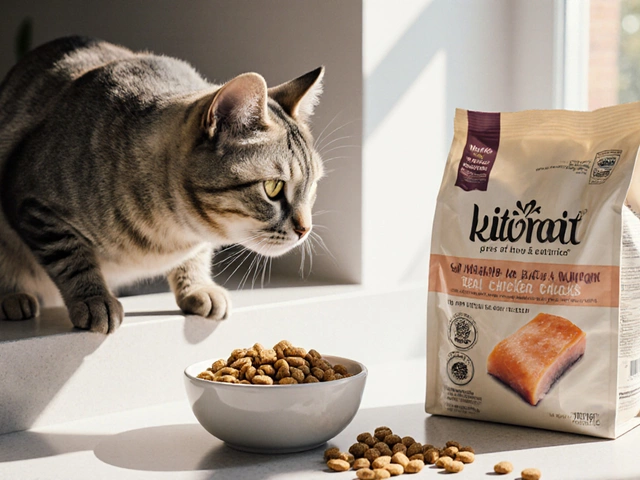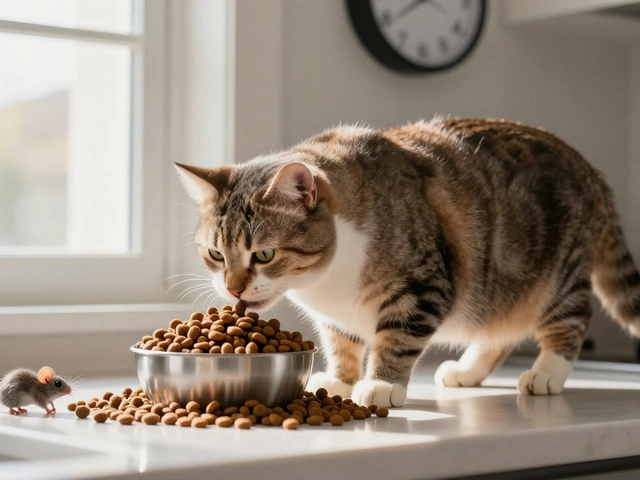Ever caught your dog eyeing your post-workout shake? It's a common sight for dog owners, but before you start sharing, hold on a sec. Human protein powder might seem like a good way to boost your pet's diet, but there's a lot you should consider first.
Dogs need protein just like us, but not all proteins are created equal—especially when it comes to our four-legged pals. While your whey or plant-based blend might do wonders for you, it might not be the same for your dog. Many protein powders contain additives or artificial sweeteners like xylitol, which can be downright dangerous for dogs.
A quick sip of that shake could lead to an upset stomach or worse. So, it’s super important to understand what your pooch really needs and how to meet those needs safely. Stay tuned as we dive deeper into what makes dogs tick when it comes to protein!
- Understanding Protein Needs in Dogs
- What’s in Human Protein Powder?
- Potential Risks for Dogs
- Signs of Protein Overdose in Dogs
- Safer Alternatives for Canine Protein
- Consulting Your Vet
Understanding Protein Needs in Dogs
Dogs, like people, thrive on a diet that contains the right mix of nutrients, and protein plays a crucial role in their health. But how much protein does your furry friend really need? It turns out it varies depending on their age, size, and activity level.
Puppies require more protein than adult dogs since they're growing. Typically, a puppy's diet should contain about 22% protein, while adult dogs do well with around 18%. However, this isn't set in stone. For instance, working or highly active dogs might require even more protein to keep them energized and support muscle maintenance. On the other hand, senior dogs might need some dietary adjustments due to possible decreased activity levels and health issues.
Here's a simple look at protein requirements:
| Life Stage | Recommended Protein Percentage |
|---|---|
| Puppies | 22% |
| Adult Dogs | 18% |
| Senior Dogs | Reduced Protein Depending on Health Needs |
Besides supporting muscle development and repair, protein is also essential for producing hormones and enzymes, promoting a healthy immune system, and even keeping their fur looking mighty fine.
Before making any drastic changes to your dog's diet, it's crucial to consider what your dog is getting from their current food. Most commercial dog foods are pretty good at providing balanced nutrition. But if you're considering adding supplements like human protein powder, know that it could disrupt this balance, particularly if not done right.
Always keep in mind that you should prioritize your dog's specific health needs and adjust accordingly. This is why it's wise to consult with a vet if you're unsure. They can provide guidance tailored to your pup's unique lifestyle and health status.
What’s in Human Protein Powder?
Alright, let’s break down what’s inside that tub of protein powder sitting on your kitchen counter. Most human protein powders are crafted to help folks like us build muscle and recover post-workout. They usually feature a few main types of protein: whey, casein, soy, pea, or even rice protein.
Now, whey protein is a biggie. It comes from cow's milk and is packed with essential amino acids. It’s easy for humans to digest, making it a go-to option for many fitness enthusiasts. But then there's casein, another milk-based protein that digests slower, offering a prolonged source of those muscle-building amino acids.
Some powders cater to plant-based diets with proteins like soy and pea, which are top plant-based choices. While they're super beneficial to us, there's a catch when it comes to your pooch.
Most human protein powders don't just contain proteins. There's often a mix of other ingredients—flavorings, sweeteners like sucralose or even something super risky like xylitol (that's a big no-no for dogs), and sometimes even added vitamins and minerals tailored for the human body.
For all you data lovers, here's a little peek at what's often found in a scoop:
| Ingredient | Common Purpose |
|---|---|
| Whey Protein | Muscle recovery, protein synthesis |
| Xylitol | Sweetener (toxic to dogs) |
| Sucralose | Zero-calorie sweetener |
| BCAAs | Support muscle growth |
Thinking of sharing? Keep in mind that the additives in human powders aren't designed with dogs in mind. The artificial sweeteners can spell trouble; xylitol, in particular, is pretty toxic to dogs. So, while human protein powders help you fuel your muscles, they might be a bit too much or completely unsuitable for your furry friend.
Potential Risks for Dogs
So, you're probably wondering, "What's the big deal with giving my furry buddy some of my protein powder?" Well, let's break it down. While sharing is caring, when it comes to dog health supplements, it might not always be the best idea. Human protein powders often come loaded with additives and ingredients that aren't exactly dog-friendly.
One of the top worries is artificial sweeteners. For instance, xylitol, a common sugar substitute, is fine for us but can be toxic for dogs. It might cause a rapid drop in blood sugar, leading to symptoms like weakness, vomiting, and even seizures. Scary, right?
Then there's the protein level itself. Too much protein can put a strain on your dog's kidneys, especially if they're older or have health issues. While that extra boost might help you bulk up, it could be overkill for your dog.
Let's not forget the different types of protein powders. Some have chocolate flavors or added caffeine – both huge no-nos for dogs. Chocolate is toxic, and caffeine can lead to hyperactivity, increased heart rate, and restlessness.
Here's a quick warning list to keep your pup safe:
- Avoid flavors like chocolate that are toxic to dogs.
- Watch out for nuts and certain seeds, which dogs don’t digest well.
- Check for xylitol or other artificial sweeteners.
Bottom line? While it might be tempting to give your pup a taste of that shake, the risks might outweigh any potential benefit. Always steer towards safer alternatives designed for dogs, and consult your vet for the best advice.

Signs of Protein Overdose in Dogs
Giving your dog too much protein isn't just a case of being a generous pet parent. Like anything in excess, it can lead to problems. Here's what to watch out for if you're worried about protein overload with your furry friend.
First off, you might notice some visible changes in your dog’s appearance. An overload might lead to unexpected weight gain, putting your dog on the fast track to obesity, which is not awesome. This extra weight can stress their joints and heart.
Another red flag is the condition of your pup's coat. Too much protein may cause a lackluster appearance that's dull and brittle. You might also see them experiencing increased shedding, but don’t freak out just yet.
Gastrointestinal issues are another giveaway. Think diarrhea, vomiting, or flatulence that could clear a room. These symptoms basically mean your dog’s digestive system is shouting, "Too much!"
Frequent urination and increased thirst can also tip you off. When your pup processes excess protein, it leads to more nitrogen in their system, causing what's known as polyuria and polydipsia. Translation? They're peeing and drinking a lot more than usual.
If you see any of these signs, it might be time to reconsider tossing that extra scoop of protein or, better yet, consult with your vet. It's great to care about your dog's health, but it’s even better to ensure they’re getting the right nutrients in the right amounts.
Safer Alternatives for Canine Protein
So what can you give your dog instead of that human protein powder? Good news, there are plenty of safer options tailored to your furry friend's needs. Dogs have their own nutritional profile, and it's crucial to stick to things that cater specifically to them.
First off, consider commercial dog health supplements. Many brands offer protein powders designed just for dogs, with the right balance of nutrients and no pesky additives like xylitol or artificial sweeteners. These products often include ingredients like chicken, beef, or fish, which are familiar and safe protein sources for your pet.
If you're more into the DIY approach, you can add some good ol' cooked meat to their meals. Chicken, turkey, and lean beef are all great choices. Just make sure they're cooked plain, with no added spices or sauces. A bit of scrambled egg can also be a nice protein boost.
For plant-based protein sources, think about adding cooked lentils or peas to their diet. They're packed with protein and safe for most dogs to digest. Just remember, moderation is key!
Check out this simple table for a quick comparison of protein sources:
| Protein Source | Notes |
|---|---|
| Commercial Dog Protein Powder | Safe and balanced for dogs |
| Cooked Chicken or Beef | High protein and easy to make |
| Scrambled Eggs | Quick and nutritious |
| Cooked Lentils | Great plant-based option |
Of course, always keep portion sizes in check to avoid protein overdose, which can be harmful. It's smart to chat with your vet for personalized advice—they can help you nail down the best choices for your dog's specific needs and health conditions.
Consulting Your Vet
If you're thinking about adding human protein powder or any supplement to your dog's diet, your vet is your go-to resource. Vets understand what makes dogs tick when it comes to nutrition. They have the knowledge to assess your pup's unique needs and can offer guidance that's spot-on for your pet.
First off, vets consider your dog's age, breed, weight, and activity level. Each of these factors plays a huge role in determining their protein requirements. A highly active dog or a growing puppy might need quite different nutrition compared to a senior dog who prefers napping to fetching.
Before making any changes, give your vet a complete rundown of your dog's current diet and any health issues. Your vet might do a basic health check or suggest specific tests if they're concerned about nutritional deficiencies. This helps in tailoring the best diet plan for your furry buddy.
Sometimes, it might feel tempting to go rogue based on internet advice or what worked for a friend’s dog. But remember, not all advice fits every pooch. Plus, regulations around pet supplements aren't as strict as they are for human foods, so your vet's input is crucial.
And here's the truth bomb: Many health conditions, like kidney or liver issues, can seriously get worse with high protein intake. So, if your vet gives a thumbs down, it's best to explore safer alternatives.
Your vet isn't just a gatekeeper but a partner in your dog's health journey. They can recommend specific protein supplements designed for dogs, or suggest natural protein sources like lean meats or eggs.
To sum it up, consulting your vet isn't just a good idea—it's an essential step in keeping your furball healthy and happy. After all, their wagging tail is worth every extra bit of care, right?







